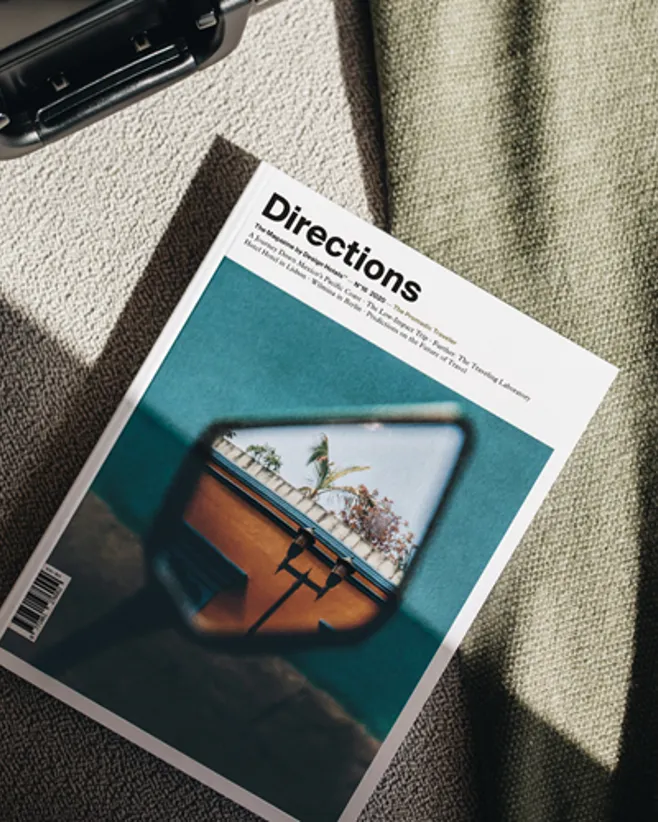
Illustration Jun CenDate 30 March 2020
Within the next decade, key value shifts will have taken place, taking us into the age of the Promadic Traveler. Instead of acting as consumers who deplete the resources of the destinations they travel to and work in, they will aim to leave a positive impact, taking them from consumers to producers. Where once travelers looked to have their trips and journeys seen by a highly visual generation, the Promads will want their travels to provide an extra layer of meaning—both personally and communally.
As restaurant-led hotels come to the fore as attractions in their own right, innovative food offerings that align with Promadic Travelers’ ethics will captivate inquisitive and conscious travelers seeking purpose in what they eat, as well as in where they stay. With its monastic design, Eremito functions as an eco-luxury hermitage, where visitors disconnect from the digital and material distractions of contemporary life. Here, food follows concept with farm-to-table vegetarian cuisine and an emphasis on silence in order to reconnect with a deeper, perhaps more meaningful reality.
The demand for authenticity and word-of-mouth credibility is shaping how future travelers will document their experiences, with younger influencers eschewing the old curated and filtered approach, opting instead for a candid, unretouched style of documentation. The current approach is already turning off Gen Z, with 56% saying they believe that too much emphasis is placed on social media when traveling, according to Booking.com.
Adopting a new-generation approach to documentation, Louis Vuitton turned to 18-year-old You-Tube star Emma Chamberlain—known for her lo-fi, candid content—to share her experience attending the brand’s Paris Fashion Week show. More than 10 million people have watched her self-shot, stream-of- consciousness take, which moves away from the curated approach of traditional influencers. “People want something that feels a bit more voyeuristic—not as beautifully retouched or styled,” says Amsterdam-based hotel company EHPC’s Laura Nolte. “It will be interesting to see who adopts this first.”
Forget “glamping.” In the new highend outdoors, nature and architecture will blend into one across increasingly far-flung destinations. Promadic Travelers’ quest for exclusivity and wellness will push them to explore extreme nature, using the great outdoors to build resilience, unplug, and grow as individuals. With the climate crisis creating harsh temperatures and changes in seasonal destinations, hoteliers will also combine the trend for exclusive, “nowhere” destinations with the call for sustainability by building highend eco-resorts that are designed to withstand extreme environments.
Svart, the world’s first energy-positive hotel in Norway’s Arctic Circle, uses solar panels on its roof to generate the hotel’s energy for the whole year. The project was conceived to attract travelers looking for extreme nature that is exclusive, untouched, and pure. As Trippin’s co-finder Sam Blenkinsopp says, “such experiences have the ability to excite the soul in a way that technology cannot.”
For Promadic Travelers, a desire for personal advancement will not be divorced from a need for collective progress, making them opt for experiences that enable both at the same time. Catering to the wish to personally progress, the Modern Elder Academy in El Pescadero, Mexico requires guests to submit an application alongside a €4,955 tuition fee to fund their stay. Those selected embark on a week-long ritual of wellness and exercise to confront mortality and aging.
Fundamentally, the Promadic Travelers are driven not by the questions of what and where, but why and how. They will seek simplicity and the notion of things being enough, rather than the excess of previous decades. But in so doing they will also want seamlessness and flexibility in the way they travel, demanding moments of enlightenment, actualization, and understanding. Their values and desires will lead Promadic Travelers to behave in new ways. The hope is that this emerging Promadic lifestyle nurtures not only a more responsible travel sector but a better, more sustainable world.

The preceding article is excerpted from the 2020 edition of Directions, an annual magazine by Design Hotels that looks at movements underway in art, design, food, wellness and fashion, and how they affect the way we live and travel. This year’s issue explores the motivations, values, and desires of the Promadic Traveler of tomorrow—one who does not ask where to travel, but why.